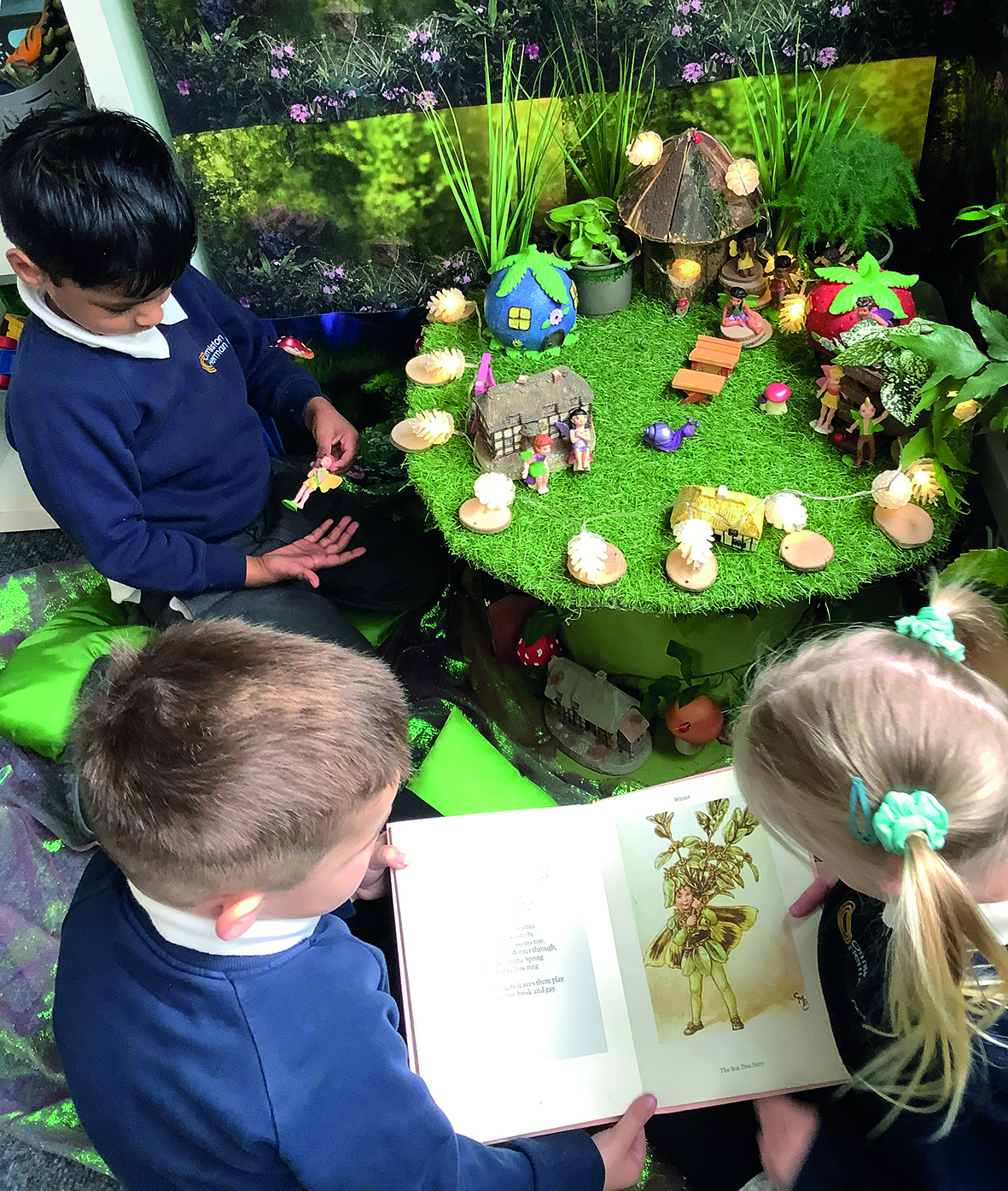
Enhancements which create a special event can open a wealth of engaging learning opportunities. One day the nursery children were very excited to discover that a ‘fairy garden’ had appeared in their small-world area. The adults were very excited too – the staff have an important role in getting the most out of special event enhancements. We all came to sit down together to work out how the fairy garden had appeared. We noticed that a rolled-up letter had arrived in one of our plants near the whiteboard, along with two lovely fairy figures. The letter was read to the children, and it explained that the fairies were asking if they could stay with us in the classroom for a while. It was a unanimous decision from the children that “yes” they could stay.
The fairy garden was made by painting a cable reel green and putting some artificial grass on top. There were some small living plants to look after on top. A staff member had donated some lovely cottage ornaments, and these were added to the enhancement. Just like with the real china tea set mentioned earlier in the series, these ornaments are something that some people may be reluctant to let children play with, thinking they might be rough with them and break them. With high expectations of behaviour and treatment of equipment, the children handled the ornaments with care. Children feel trusted when they are allowed to play with more grown-up items, which works towards promoting high self-esteem, and the ornaments remained in perfect condition throughout. Some additional fairy homes were purchased at Poundland, and some wooden slices and pinecones were added. LED pinecone lights were placed around the fairy garden for an additional sensory element and to make it look extra special. Lastly, for £20, we purchased online a beautiful set of fairies called Friendly Fairies Super TOOB by Safari Ltd. This set includes fairies from several different racial backgrounds, and it has both male and female fairies.
 We always add relevant books to our enhancements, one of which was in this case Seasons of Flower Fairies by Cicely Mary Barker. The children were interested in looking through this book together due to the beautiful and intricately detailed illustrations, which acted as prompts for conversations about the fairies and the seasons they represent.
We always add relevant books to our enhancements, one of which was in this case Seasons of Flower Fairies by Cicely Mary Barker. The children were interested in looking through this book together due to the beautiful and intricately detailed illustrations, which acted as prompts for conversations about the fairies and the seasons they represent.
The fairy garden led to imaginative play that was in a different direction to the usual play in the small-world area. The children enjoyed having their ‘mini me’ toys visit the fairy garden and talk to the fairies. The fairies were sometimes taken out of the garden to visit other places in the classroom. The children also explored the natural objects on the table using all their senses.
The fairy garden also gave a purpose to some adult-led activities. For example, the letter that the fairies sent asked the children to draw the fairy garden and send them some pictures. Clipboards with fairy bordered paper were placed next to the enhancement. The adults encouraged the children to look carefully and choose something to draw. The drawings were sent to the fairies in a special post box once they had left. Another time, the fairies left us some mini fairy cakes. We decided to write the fairies thank you letters, leading to some purposeful mark-making and name writing. We also went for a nature walk and collected natural objects from our playground woods.
Photos of the fairy garden were shared with parents. Whenever we had any visitors to the classroom, the children always excitedly told them about the fairy garden and took them over to see it. When our principal came in one day, a little girl said, ‘Look at our fairy garden, Mrs Redhead, the fairies have come to see us. I have been playing with the fairies in the strawberry house.’ When we looked, we could see her ‘mini me’ toy was placed at the doorway of the strawberry house and was surrounded by her fairy friends.
Amy Jackson is EYFS specialist leader of education and teacher at Ormiston Herman Academy, Gorleston









